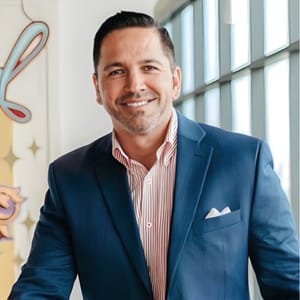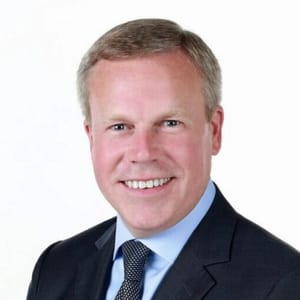This panel discussion between Ben Shaw (CFO, Vantem), Harold Tamayo (Interim CFO, Neighborhood LTC Pharmacy), and Kevin Schuler (Former SVP, Corporate FP&A, Warner Bros. Discovery) took place at the FP&A Summit in Boston in October 2023.
Ben Shaw
I'm the CFO of Vantem. Vantem is a company that builds modular housing - houses built in factories. We're a startup in the U.S., and we've been in Latin America for about ten years.
My background is that I’ve been the head of finance for startups generally. I've been in real estate for the last ten years. Before that, I was the head of finance for a tech company, and prior to that, I was in investment banking and consulting.
I usually come into companies as the first internal finance guy, so I'm responsible for hiring the controller, building the FP&A function, figuring out the models, and doing strategies.
Harold Tamayo
I’m currently leading the finance function as the CFO for a long-term care pharmacy and remote monitoring patient organization that focuses on individuals with developmental disabilities.
My experience has been as a CFO and FP&A. I've also been a controller in large multinational enterprises like Novartis and Merck, and very big companies like CVS Health and McKesson, where I was the SVP of investor relations, corporate FP&A, and mergers and acquisitions.
Kevin Schuler
I began my career at General Electric and GE Capital, where I learned core finance skills like accounting, operations, controllership, and FP&A.
I then moved over to NBC Universal and spent several years in multiple finance roles both in New York City and in Los Angeles across the network, including Bravo USA, SYFY, advertising, sales, and television production.
Then I moved across the street to Time Inc., which was the magazine division of Time Warner at the time, to augment and build out the FP&A function.
After the great recession, Time Warner decided to spin off Time Inc. into its own public company. So I was part of the team that worked on the IPO, the credit markets, and all that kind of stuff to spin off the company.
I got great exposure to the CFO skill set and investor relations audit as part of going through the public company process.
Most recently, I ran global FP&A for Warner Brothers and WarnerMedia, which is now Warner Bros. Discovery.
- Beyond numbers: Essential skills for FP&A professionals
- Centralized vs decentralized FP&A teams
- Collaboration is key in FP&A
- Standardizing data across business units in FP&A
- Fostering continuous learning and development in finance teams
- Scaling FP&A teams: Balancing headcount and skill sets for growth
- Identifying crucial roles and skills for FP&A
Beyond numbers: Essential skills for FP&A professionals
Ben Shaw
What are the key competencies that you look for when you're hiring in FP&A?
Kevin Schuler
For me, it’s about being collaborative. You can only get so much information from the GL, and it's all about identifying the context around the number.
So, being collaborative, forming relationships with folks, and forming trusting relationships when you're going through the risks and opportunities.
If you don't have those relationships, you're going to get whatever's on the page, and whatever that president of the division didn't want to tell you, you're not going to find out.
But suppose you have the relationships and the trust. In that case, you're going to get that information and you can start to think about how you’re going to mitigate this potential risk that you now know about, whereas you wouldn't be able to do that without trusting relationships.
Harold Tamayo
I’d like to break it down into three components. The first one is that you’ve got to know your fundamentals.
A lot of FP&A people who are starting in their careers frown upon that, but it's difficult to become a very good FP&A person if you don't know revenue recognition, as an example.
In my opinion, you have to understand the foundational components from an accounting perspective so that you know what’s in your P&L.
The second one, as Kevin mentioned, is collaboration. What kind of team player are you? And can you maneuver through the different environments?
When you're in FP&A, you're probably supporting various groups like HR, operations, sales, and marketing, and they all have their own dynamics.
The third one is to know your business. How do you make money? How do you spend your money?
Rather than coming in and talking about budgets and forecasts, can you speak to how they understand the business and how they see the business? Once you do that, then you can inject your finance knowledge, and they’ll be more likely to listen to you.
Ben Shaw
I'd agree with that. Having a general business sense is really important. That comes from knowing your business, and understanding how businesses work in general. When you look at numbers, does this number make sense from a general business perspective?
And then beyond that, there's a skill that I’ve found incredibly useful. It's that skill of being able to look at a spreadsheet and see the number that looks wrong, or when you run a scenario and the result is X, and being able to say, “It just doesn't feel right.”
It’s about having that gut sense to be able to check if these numbers sound like what they should be, and that's a really hard skill to teach. Some people have it. They just understand how numbers change. Some people don't. And I have no idea how you interview for it.
Harold Tamayo
Let me expand on that because that's very interesting what you just said. How about when some individuals in your group provide you with a forecast and when you look at it, you shake your head and say, “This makes no sense. Where is the trend?”
You look historically.
Say you have an average price, and in August it says it's a hundred dollars, but you look historically and it's fifty dollars on average per unit.
How do you come up with those numbers? What kind of things do you tell your team?
Ben Shaw
I try to coach them and I try and spend a lot of my time with my teams, working through models with them on a granular basis and coaching them on why a trend doesn't look right to me, or going back and looking at historical numbers.
I may have the context that they don't have, and I may say, “I happen to know that we're going to need to spend more in this area going forward, and this is why.” I’m trying to give them that context to the business while going through that process.
To me, finance is very much a hands-on business. I found the pandemic and working from home incredibly difficult because we teach our staff how to do forecasting by working through models with them. I don't know about you guys, but I found that incredibly difficult to do in a work-from-home environment.
Kevin Schuler
Always ask folks to answer questions like, “Why are the numbers what they are? “How are they what they are?” Instead of just the ‘what.’ The ‘what’ is easy. It's the ‘why’ and the ‘how’ that are more difficult.

Centralized vs decentralized FP&A teams
Ben Shaw
The next question is about how you put teams together, whether they’re a centralized team in having an FP&A team at the center of the business, or whether you decentralize those teams and move them out into the business units.
I come from small startups where that's less of an issue, but we have some folks who've worked at bigger companies. I'd love to hear your perspectives on how you make that distinction between a centralized FP&A team and a team that's more buried in the business units.
Harold Tamayo
If you're at a global organization and all your FP&A teams are in your office, you're pretty far removed from the business. You've helped roles at the corporate level of the FP&A, and if everybody's there, you're kind of missing the pulse of what the business is.
In my view, it all depends on the activities that they have.
For example, I was at a global organization where we had a lot of FP&A individuals creating a lot of standardized reporting. The reason we did all of that is because there are certain things that you can manage for the business with standardized reporting, credit efficiencies, etc.
That, you can move, or at least we thought we could. We were very successful in moving that reporting and much of that went to India at the time as outsourcing.
But when it came to working close together in the business and understanding from a commercial standpoint, what it means to understand the customers, what it means to understand the partners that you're dealing with, the decentralized option wasn’t there for us because you have to have that intimacy with the people that you're working with. The farther you are, the more difficult it becomes.
Now, what changed the dynamic somewhat was the pandemic. We all went home and now everybody was removed. But that didn't exclude our engagement with our business partners regularly. We could understand what they were going through, and we could then provide that context of business to finance and give the right guidance.
Kevin Schuler
I also think it doesn't have to be either centralized or decentralized. It can be a mix of both.
At one of the organizations I worked in, 70% of the business was pretty much one product line. Multiple different brands, but one product line. The rest of it was all different.
You never want to say, “Alright, we're going to save costs and do a centralized organization across all of it.” The 70% that's like, great. You can scale India and you can centralize that part of it and then leave the other piece alone that’s close to their business. You still get close to your business, but you get the economies of scale by centralizing like product lines.
Also, think about what kind of business you're in. For highly regulated industries, you'll want to have centralized because you want to make sure you've got reports, controls, and everything all buttoned up from the top down.
Ben Shaw
In the startup world, I find that it tends to be centralized because you don't have a whole lot of resources and you don't have a whole lot of expertise distributed around the company, so you tend to control that stuff fairly centrally.
Harold Tamayo
The organization I support now is small and we don't have a whole lot of people. I’m the one who works remotely, but I'm very close to understanding the parts of the business and the things that they're doing.
Having everybody close together is a way to work more efficiently.
Collaboration is key in FP&A
Ben Shaw
How does the FP&A function collaborate with other departments?
The critical part of being in FP&A is to work very closely with each of the departments that you're trying to do your forecasting for.
You can't be sitting there in a vacuum creating numbers that you think might be right without understanding the complexities of the department that you're working with, without understanding what priorities they have for that year, what activities they want to be doing that year, how that fits into the overall goals of the company, and what particular activities they're going to be doing in the upcoming period.
You have to be actively involved in the business. You have to understand what it is they're doing and you have to collaborate on the forecasts that you're producing.
Kevin Schuler
From a self-serving standpoint, I think the more you collaborate with divisions, the more the operators may come to you and say, “I have this problem that I'm trying to fix. I really need some help figuring it out.”
You get the opportunity to help them solve a problem, help everybody achieve the budget, and get better at what they're doing. You get to do something you wouldn't have done otherwise if you hadn't collaborated with one of the divisions and one of the operators.
Ben Shaw
I try and tell my finance team that the objective of our team is to be an enabler for the business. I want the business to come to us with their problems and say, “How do you help us fix this problem?”
In many organizations, finance and HR are viewed as the blockers. Once I've figured out my project, I then have to go to HR and finance and get them to approve it. I want to try and flip that on its head and say, “When you're thinking about doing something, come to us first and let us help you figure out how to get it done.”
Harold Tamayo
I think that there’s a level of humility being in finance that you’ve got to show to be a partner and collaborate with your business.
I'll give you an example. When I started my career, I was supporting sales and marketing. One of the things I did was go in the field with the reps on customer visits so that I could understand when the VP of Sales was talking to me about their budgets and they were thinking about reaching frequency, meaning how often the sales reps see customers. I then understood their language.
I worked for Novartis for about seven years and I supported oncology. One of the things that I did was go with the researchers and clinicians. I probably didn't get half of what they were saying, but I understood it enough that whenever we’d talk about their activities, budgeting, and forecasting, I could speak to many of the things that they were saying. And that was appreciated by them.
The way I think about collaboration is to understand your customer's perspective, just like you do in sales when you're trying to sell a product. What’s your customer's perspective? My customers are the people that I'm supporting.
I'm going to push and I'm going to challenge. It's a little bit different because I'm not trying to sell something, but I'm trying to provide a service, and the service is to help them make better decisions.
Ben Shaw
My last business was a lab management business for bio and pharma. When I had a new hire come into the finance department, the first thing they did was go and spend a day in the lab figuring out what a lab does, because most of us have no clue what labs do.
So you go and work, sit with the teams there, and figure out what they do. When they start talking about a piece of equipment, what is that piece of equipment that they're talking about? What does it do? How do our clients use it?
If you don't know what the employee does, you have no idea how important it is.

Standardizing data across business units in FP&A
Ben Shaw
With regards to how you're doing business today, how do you manage data in the FP&A team to keep consistency amongst the units?
Harold Tamayo
In my previous company, we worked on a big project for three and a half years, which was called the data liquidity project.
The reason we started it is because when we looked across the organization, it was very difficult to standardize and get the right level of analytics and insights that we needed. Either the sub-ledger wasn't structured appropriately because we had five to ten different ERPs and different FP&A systems, or some people might have been putting T&E inside the project cost, and they never made it to the T&E side.
So, you’ve got all these things where the standardization of the data is required and governance around that data standardization is also required in order to drive the value of the insights that you're going to need.
Kevin Schuler
For us, having a data specialist in the FP&A team was really important. We were actually decentralized. That 70% I talked about earlier was decentralized at one point. So, even though they were all like businesses, they were decentralized.
We had the exact same thing where somebody was putting something in a product versus a department versus an account. It was a mess. So, having that data specialist come into our FP&A team when we rolled out a new financial reporting and planning system was hugely important.
We weren't necessarily going to go back and fix everything in history, but at least going forward, we could say, “No, this isn’t how we're doing it now. This is where T&E gets booked.”
It was really important to have a gatekeeper who knew how to speak a data language that we didn’t as FP&A. We needed someone who knew the structure of the ledger, how to say no, and the reason why.
Ben Shaw
That person needs to know how the transactions ought to be flowing through the P&L and be able to spot when things are out of whack. When something's being entered incorrectly, they can say, “That's probably not where that's supposed to be going. It should be going somewhere else.”
Hopefully, AI will help us with some of this stuff.
Kevin Schuler
I heard someone say that AI could fix our data problems. Hopefully, that's true. But if it can't, nothing will work. AI isn’t going to work. The five-million-dollar reporting system on top of all of your data that's not consistent won't work. It doesn't matter. So you have to fix the core data.
Harold Tamayo
The amount of data that we produce now in any given time is so big, so somebody needs to oversee the quality of what goes into the systems, and the standards have to be tough.
Fostering continuous learning and development in finance teams
Ben Shaw
Let's talk a little bit about professional development and how you foster professional development and continuous learning within your teams.
Kevin Schuler
I think it's about showing up to events like this and letting our team see that we're doing it. Bring your team members with you. That shows that you value it and that it's important to your team as well. I think showing by example is the best way.
Harold Tamayo
I have this philosophy which is that professional development is up to me. One of the things I'm going do as a leader is provide guidance, coaching, support, and all the necessary tools. One of the things that I like doing in terms of professional development is supporting and creating avenues for individuals to develop themselves.
It's easier to blame the leaders rather than to take accountability for the things that you need to do for your path to grow and compete for the roles that you want to go for in the future. Ultimately, it's your career.
Ben Shaw
I agree. I think it's the leader's role to develop the team. If a team member is failing at a task, you have to ask, What is it that I've not given them that they need to complete this task? Do they not have the right skills? Do they not have the right tools? Do they not have the right training? How do I provide that for them?

Scaling FP&A teams: Balancing headcount and skill sets for growth
Ben Shaw
What are the considerations when scaling the team in terms of both headcount and skill sets?
Harold Tamayo
There's a lot of art involved in doing that because you’ve got to understand the vision of your group. Where is it that you want to head? It's going to look different depending on the organization and the sophistication of that group.
For example, when I came into my current organization, one of the basic things that we were missing was controls on the reconciliation process of the revenue. We were going from one system to another to another, and across all of that, we were missing revenue.
So, what did we need to do? We had to develop some of the controls and some of the skillsets of the team to learn how to check and provide the level of reconciliation on the revenue side because it’s high volume, lots of transactions, and you’ve got to be able to do that.
So, if I only think a year ahead, which is not that far ahead, given the size of the organization, then I’ve got to put a system in place, I have to put the skill set training in place for the people that are there, and then a way that they can practice and create controls, etc.
So, you have to think, where in the life cycle of maturity of that organization is that?
Kevin Schuler
I agree. But I also think it’s twofold. One is to look at what your skill sets are and where your gap is.
The specific example I can think of is when we spun off Time Inc. from Time Warner. We had the benefit of having Time Warner Treasury manage all of our cash flow. We didn't have to worry about cash flow when we were a division.
But when we spun off, all we had to worry about was cash flow, being on our own, and paying off debt. So we had a very specific need to hire a treasure, to hire people who were experts in cash flow, who had worked through cash flow in the past. That was a very specific need.
Who invented the light bulb?
Thomas Edison, right?
Not exactly, partially.
Thomas Edison was friends with Sir Joseph Swan from the UK. Joseph Swan was trying to build a light bulb with a paper filament. He had partially evacuated glass with a paper filament.
Warren De La Rue had coiled platinum filament. Heinrich Göbel had bamboo filament.
Edison coordinated with all these folks. He pulled all the pieces together and created the light bulb as we knew it when it was first invented. But it wasn't Thomas Edison. It was him taking the ideas of all three of them. If Edison had just hung out with his paper filament buddies, who knows what would have happened?
So, you have to take ideas from everyone.
Ben Shaw
I think it starts with having a clear sense of what it is that you're trying to do in the upcoming year. You've got to have a plan for what your team is trying to achieve and what skills you're going to need to achieve that, and then go out and hire the people that you think are going to be able to contribute to those skills, whether they have them when they're hired or not, but have the right characteristics for that.
Harold Tamayo
To me, diversity is an entire spectrum, and part of that spectrum includes diversity of thought and experiences.
If I hire a team that has only done FP&A in sales and marketing, but I need somebody to support manufacturing and the corporate functions, I'm not saying that they wouldn't be able to learn it, but when I think through about being able to bring those experiences together and measure and share new things and ideas, it’s important for me to also have that diversity of thought.
Identifying crucial roles and skills for FP&A
Ben Shaw
Are there any essential roles or skills in FP&A that you must have?
Kevin Schuler
You have to have someone keeping the trains on time with a calendar or timeline of deadlines.
One thing I’d like to do is be able to have the teams have some sort of very specific responsibility, maybe a P&L line, but then also own the board of directors communication or investor relations communication. You can be an expert in part of the P&L, but you also get to see the whole organization.
That's the best part about being an FP&A; you do see the whole organization. You can figure out where you want to go next and trade those out sometimes. So maybe someone who’s doing IR can switch and do board directors and IR to get people with different skill sets.
Harold Tamayo
I like to have someone who knows how to consolidate the financials. When it all comes together, I'm not the last person that has the final view. I like having somebody who has the final bill before they get the financials to me, so I'm not catching a lot of the things that should have been caught before they got to me.
That consolidation person has generally had a different array of experiences and different functions so they can catch and see what’s rolling up because they're going to be able to help me put together a presentation, etc. Not that I'm not hands-on, but I think that there’s also a good training ground for a very good number two that can eventually do other things.
When it comes to skill set, you need a good understanding of the different components of what makes a good FP&A person, which is your basic understanding of accounting, being able to understand more than just the P&L, the balance sheet and cash flows, and being able to to have the leadership skills to manage the different groups of individuals and business partners that they’ve got to work with.
FP&A Certified Core course: Reach your full potential
Elevate your career with our FP&A Certified Core course, meticulously crafted for professionals like you who are driven to excel.
Whether you're looking to refine your analytical skills, master budgeting, or steer strategic decisions, this course provides the tools you need to succeed.
By enrolling today, you gain access to expert-led tutorials, real-world case studies, and interactive simulations designed to boost your confidence and credentials.
Don't just meet the industry standards—set them.
Enroll now and transform your professional journey with every module you complete.






